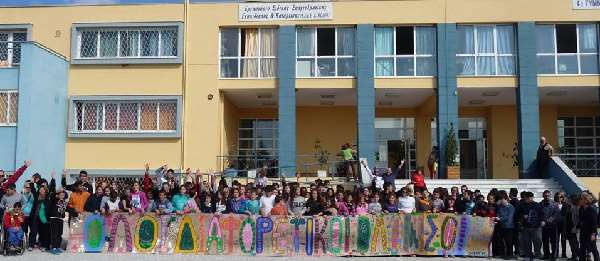
09-08-16 Bill allows educators with 'fewer qualifications' to teach special education classes
A public consultation is underway over provisions of a bill that introduces sweeping reforms in special education, including a new framework for special education vocational training, creation of the new special education junior and senior high schools (gymnasia, lykeia), and eliminating a fractured system of overlapping special education programmes (which included various TEE and special education vocational high schools).
The reforms are enshrined in a special amendment to a bill on Greek language-teaching and multi-cultural education.
In the new uniform type school, there will be four junior high school (gymnasio) grades that follow the programme of regular, general education junior high schools, augmented by activities aiming at pre-vocational preparation.
The graduates of the four-year junior high schools will receive a diploma equivalent to that of regular high schools, without the vocational specialisation which until now was required. This eliminates the untimely and pedagogically unacceptable premature specialisation of students.
The four senior high school grades will follow the programme of regular evening vocational high schools, and graduates receive a degree equivalent to that awarded by regular high schools [lyceums]. The bill regulates the institutional framework of Workshops of Special Education Vocational Training (E.E.E.EK.), adjusting the programme to meet the needs of students.
There is a provision that clearly states the qualifications of Special Training and Education (EAE) teachers, and abolishes the distinctions between schools and between teachers, ensuring the prospect of transfers of teachers with special education training to regular general and vocational training schools, and vice versa. Now, teachers without any particular special education backgrounds will be allowed to teach special education classes. The time framework set ensures personnel stability in corresponding structures, as is required for pedagogical reasons.
In addition, teachers from university education categories PE60 (kindergarten) and PE70 (primary school) with special education training can work in special education, on an equal basis with formal special education teachers in the PE61 and PE 71 categories. This restores legality and normalcy in personnel changes.
Another provision allows temporary postings in special education slots of experienced teachers with fewer qualifications in special education. This provision existed before, but the phrase “fewer qualifications” is introduced for the first time.
This is because the total number of teachers with a specialisation in special education cannot cover personnel needs. That resulted in the hiring of substitute teachers from the general education registry. In the 2015-2016 school year,1,000 general education substitutes were hired without evaluation of their qualifications, even though there may have been tenured or substitute educators with “fewer qualifications” in special education.
Thus, the provision uses available human resources in the best way, so as to immediately satisfy the needs of students and ensure smooth operation of special education programmes.
Finally, the aforementioned legislative amendment explicitly states the right of co-equal participation of all special education teachers and assistants in Associations of Teachers in Special Education Schools.
The public consultation on the bill began on August 5 and will end on August 20. Already, there is a plethora of comments on an amendment that aims to resolve urgent special education issues pertaining to special education units and special education vocational schools,
The Minister invites all the social partners and whomever is interested to table proposals that might improve provisions.
The public consultation site, in Greek, is at the link below.
